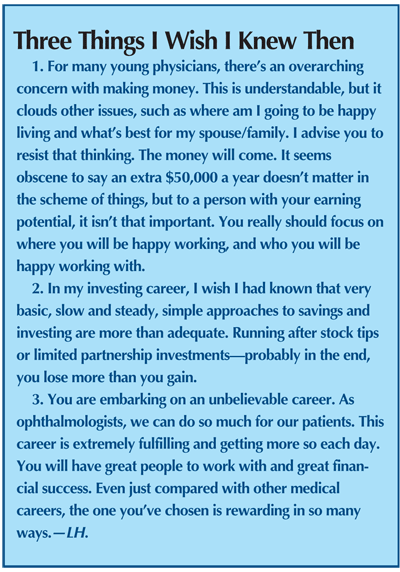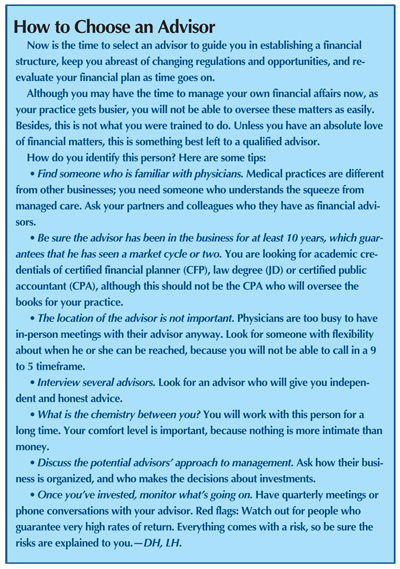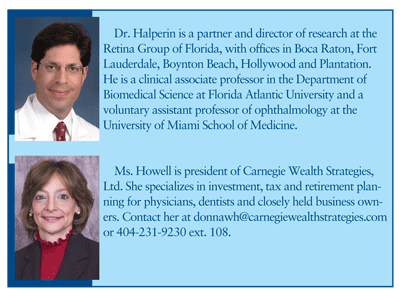The first five years of practice, after completing our training, are difficult for a host of reasons. We are clinically trained to conquer the next step, but we lack the experience to handle the tough pitfalls that we encounter as working physicians. A broad number of issues provide significant challenges: choosing a practice, analyzing contracts and handling legal and financial issues. Sometimes the best advice to help with these potential pitfalls comes from light conversations with experienced colleagues over a cup of coffee or a beer. This series will attempt to share a few pearls that you would hope to pick up during that conversation.
Through the rest of the year, we will try to formally address a number of issues that face the new ophthalmologist, and to transfer opinion and advice from experts in a codified manner. We hope that these lessons will allow for a more uniform distribution of knowledge. We look forward to a vibrant exchange of ideas.
- Jonathan Prenner, MD, and Rick Kaiser, MD, Series Editors
Most young physicians have focused so much on financing their medical education and training, it seems odd to think about financing their life. But at this juncture, along with identifying your first job, you need to create a financial plan for the rest of your career.
Of course, this doesn't mean you'll forecast exactly how much you'll make or how you'll spend it. The actual numbers are not important ("Yeah, right!" you might scoff). What's important is to create a structure that will address key areas of debt, investment and savings so that your earnings are maximized and your financial future is secured.
Before you create your plan, you need to have a long talk with yourself (and a financial professional) about your financial needs and attitudes, life goals and tolerance for risk. You need to ask:
• What does money mean to you?
• What do you want to accomplish?
• Where do you want to be in five years … and in 25 years?
In other words, figure out what kind of life you want. Some physicians only want to practice until age 50. If you want a short career, you cannot work the same way as a physician who wants to work into his or her 60s or 70s.
Some physicians want to have a large family and send all the kids to private school. Others want a moderate brood of one or two children, and send them to public school. The cost of education is an increasingly important factor in your plan.
Think about your tolerance for risk. Can you handle the ups and downs of the stock market? Do you have faith in real estate? Or do you prefer to keep your hard-earned money "tucked away" with plenty of protection? Of course, tucking it away in CDs or money markets provides risk as well, such as lack of inflation protection. You need to articulate this.
You also need to consider your individual situation. Some young physicians have a lot of school debt, and some also have their spouse's school debt. Others have no debt, and some even have "family money."
Following is some guidance on sorting out the issues that will have the most impact on your financial well-being.
Managing School Loans
As in most financial matters, the universal rules do not always apply. Although debt is often portrayed as a burden that should be eliminated as soon as possible, it may make more sense to pay off your medical school loans slowly. Let's say your loans are at 3 to 4 percent interest, and you can get 9 percent interest on your investments. It makes sense to take your time. But how comfortable are you with debt? If it keeps you awake at night, it may be better to pay off your loans as quickly as cash flow allows. From an investment point of view, it makes more sense to start funding your retirement and immediately protecting yourself and your family with disability and life insurance, and pay your loans off over time.
Disability Insurance
It may surprise you to hear that most professionals will end up being disabled at least once in their career. Car accidents, complicated pregnancy, heart attack, cancer: There are so many possible reasons. Remember that during your period of disability, you are under all the same pressure to support yourself and your family.
Unfortunately, not that many insurance companies are physician-friendly. Previously, most insurance companies had five to six classes of "insureds," and physicians were in the top class. Now physicians have been moved down because more claims are being filed by doctors. You should get quotes from several insurance companies.
Here are a few other tips:
• Surgeons need "own occupation" coverage. If something happens to your hands, you can still be a physician, so some policies won't pay for the disability. A physician will not make as much money as a surgeon, particularly a specialized surgeon such as one who does LASIK.
• Buy from a reputable insurance company that has a history of paying claims. How can you tell? It's best to work with a professional advisor who is not just selling insurance (See "How to Choose an Advisor," below).
• Get your own disability policy, even if your practice provides group coverage. If you should leave the practice, you can take your own policy with you.
• Your practice can self-insure by continuing to pay a disabled physician for a significant period of time. This enables the practice to obtain less-expensive coverage that starts at 90 days of disability (rather than sooner).
• Consider paying for your disability insurance with after-tax dollars. This way, any disability income that you receive would be tax-free.
Buying a House
This is an important rite of passage for young physicians who have postponed many "adult" acquisitions. Real estate is an investment we recommend, but don't rush into it. If you are starting a new job in a
• Whether you'll be staying with this practice.
• Whether you and your spouse like the city.
• Where you would prefer to live (consider proximity to jobs, schools and other conveniences, as well as the type of neighborhood).
You may be wondering if you can even get a mortgage on top of all your school debt. Lenders consider physicians to be very good risks, so you can rest assured that someone will give you a mortgage. The practice you work for is likely to have a local banking relationship, and this might be a good place to start.
When shopping for mortgages, be sure to lock-in to a set interest rate. It's safe to assume in the current interest rate environment that interest rates will go up, so any up-front benefits of an Adjustable Rate Mortgage (ARM) will be offset rather quickly. Even if you expect to stay in the house five years or less, it's not worth exposing yourself to the variability of an ARM.
Consider several things when deciding "how much house" to buy. This is not the time to look for your million-dollar home. If you and your spouse are leaning in that direction, there is plenty of time to go upscale in your home purchase. It's best to buy something now that is easily within your means, so that you are not house poor for the first few years.
There's nothing wrong with a so-called starter home. On the other hand, the picture is very rosy for young ophthalmologists, so you can count on an increase in income for the next several years (probably for about the next decade). For this reason, it's okay to stretch yourself just a bit to afford more house than you need at the moment.
Even if you stay in the same city for your entire career, you are likely to own two to three houses over the course of time. In a few years you will be more financially ready to move up and may also need a larger house.

Life Insurance
Even if you are unmarried and have no children, you should have life insurance to protect your family from any debt you might leave behind. At this stage in your life, you should look for the most death benefit for the least amount of premium; in other words, term life insurance. However, when you buy term insurance, be sure you can convert it to permanent insurance down the road (especially important if you become uninsurable). Re-evaluate your life insurance every five years as your income and family grow, and at any life-changing event. You can create a life insurance "ladder": You can use life insurance eventually to create additional retirement income, as well as covering estate taxes, should your needs and financial situation dictate. Have some 10-year level premium life insurance, some 15-year and some 20-year. As your net worth increases, the amount of life insurance you need will as well.
Investing
• 401k. If you can swing it, put as much as you can in your 401k (another reason to keep your housing cost down for now). Why? Because of the magic of compounding; the earlier you start, the faster it grows. For example, if you put $10,000 a year into a 401(k) account for 11 years (from age 30 to 40) and stop and the account earns 7 percent annually, your savings will equal $1,685,140 at age 70. However, if you don't start until age 40, but save the same $10,000 annually for 35 straight years, you will have put away three times as much money but your account will grow only to $1,479,130 at age 75. Also, take full advantage of matching funds that most practices offer.
• Investment vehicles. As a rule, we should all live below our means and save lots of money. In ophthalmology, we are compensated well, so this shouldn't be hard to do.
In a matter of time, you should be able to pay off school loans, purchase a house, start a family, take vacations, and still save a significant portion of income. If you live below your means, you can make money in a risk-adjusted fashion, and get a return on the amount of risk you're willing to take.
All that being said, a young person should take as much risk as he can bear. There may be volatility in the markets, but you will earn more in the long run if you take some risk. Try to become comfortable with being aggressive, without taking unnecessary risks (you want a return on your money, but not as much as a return of your money).
Diversification is key in investing today. Creating a portfolio composed of different asset classes is wise. An asset class is a group of investments with similar risk factors and expected returns such as large cap domestic growth stocks. Proper asset allocation can enhance returns and reduce the volatility or risk of your portfolio. If you have a small amount of money to invest, mutual funds are the way to go. If you like real estate rather than the stock market, a Real Estate Investment Trust (REIT) is like a mutual fund for real estate. Most mutual funds need a minimum start-up of $1,000; however, if you commit to a monthly direct debit from a bank account, you can start with as little as $100/month. 
Global or international investing is an absolute necessity because we now live in a global economy. Decide whether you want to go into emerging markets (
A good rule of thumb is that if it sounds too good to be true, it probably is. Always avoid the next "hot stock," cocktail party tips, and get-rich-quick schemes. If you invest sensibly, you don't need to make a killing in any single investment.
• Pretax spending. Anything you can pay for and legally deduct is better for you financially. The interest on your house is deductible, which is why you should always assess a real estate purchase on an after-tax basis. If you are forming your own practice, there are many pretax benefits (automobiles, disability premiums, health insurance, funding 401k, medical conferences, medical journals, professional dues), and a good accountant can help.
• Asset protection. This is very state-specific, so you need to work with an advisor who knows your state laws. For example, in
A word of caution: There are asset protection scams out there. The best thing to do is get good advice. As you build up assets, you do need to protect them. If you get into an auto accident, others will see you are a doctor, and they will sue. Be sure you have an umbrella policy, as well as high-quality homeowners and auto insurance (all money well-spent).
The good news is that ophthalmology is one of the least litigated specialties for malpractice. It's extremely rare that a creditor in a malpractice suit would extend beyond the limits of the policy.
• Planning for college. You haven't paid off your own school loans, and you are expected to plan for your children's college education? Yes, due to the astronomical cost of sending kids to college. You need to start saving for college when a child is born.
Here is a simple mantra: 529 plans. You are not taxed on the money as you put it in, and not taxed when the child takes it out for education. The money will grow due to the magic of compounding. In some states the contributions have a state tax deduction up to a certain limit, which can offer an additional benefit.
This money is for education only, but it can be used to pay for graduate school, and it can be transferred to other children or family members. If it's not used for education and you take it back, you will pay a 10 percent penalty on the gain—but given the high cost of education, it's unlikely you won't use it.
No matter what your current financial situation, just having the credentials that you've earned puts you in a favorable position. Ophthalmologists have great earning potential, and the long-term outlook is very positive for our medical specialty. Apply to your finances the self-discipline, diagnostic and decision-making skills that you honed through medical school and residency, and you'll have no problem financing your life.











